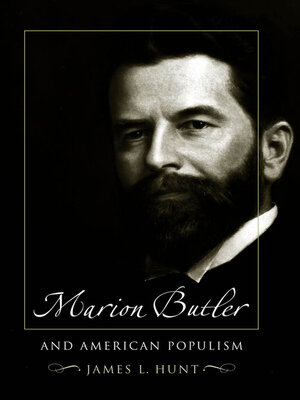
Sign up to save your library
With an OverDrive account, you can save your favorite libraries for at-a-glance information about availability. Find out more about OverDrive accounts.
Find this title in Libby, the library reading app by OverDrive.



Search for a digital library with this title
Title found at these libraries:
| Library Name | Distance |
|---|---|
| Loading... |
Exploring the life and leadership of Populist Marion Butler (1863–1938), James Hunt offers new insight into the challenges of American reform politics.
The son of North Carolina farmers and a graduate of the University of North Carolina, Butler displayed an early proclivity for agrarian reform. By age twenty-eight he led the Farmers' Alliance of North Carolina; two years later he was elected president of the national Alliance. Butler served in the U.S. Senate as a Populist from 1895 to 1901 and was chairman of the national Populist Party during the critical presidential elections of 1896 and 1900. In 1896 he helped engineer the remarkable collaboration in which Populist Tom Watson ran for vice president alongside Democratic presidential nominee William Jennings Bryan.
Departing from earlier portrayals of Butler as a political opportunist, Hunt shows him to be a genuine reformer who upheld Populist tenets in the face of enormous opposition from Democrats, Republicans, and even members of his own party. A dynamic individual with enormous capacity to mobilize and motivate, Butler sought throughout his career to convert his reform ideals, through politics, into law. His long and, ultimately, losing efforts illuminate the limitations of Populism as an ideology and as a political movement.
The son of North Carolina farmers and a graduate of the University of North Carolina, Butler displayed an early proclivity for agrarian reform. By age twenty-eight he led the Farmers' Alliance of North Carolina; two years later he was elected president of the national Alliance. Butler served in the U.S. Senate as a Populist from 1895 to 1901 and was chairman of the national Populist Party during the critical presidential elections of 1896 and 1900. In 1896 he helped engineer the remarkable collaboration in which Populist Tom Watson ran for vice president alongside Democratic presidential nominee William Jennings Bryan.
Departing from earlier portrayals of Butler as a political opportunist, Hunt shows him to be a genuine reformer who upheld Populist tenets in the face of enormous opposition from Democrats, Republicans, and even members of his own party. A dynamic individual with enormous capacity to mobilize and motivate, Butler sought throughout his career to convert his reform ideals, through politics, into law. His long and, ultimately, losing efforts illuminate the limitations of Populism as an ideology and as a political movement.







